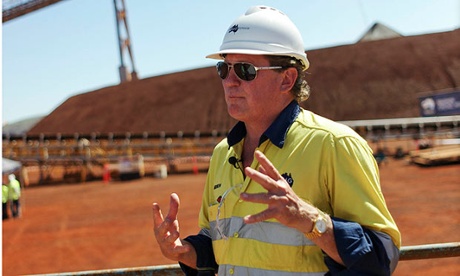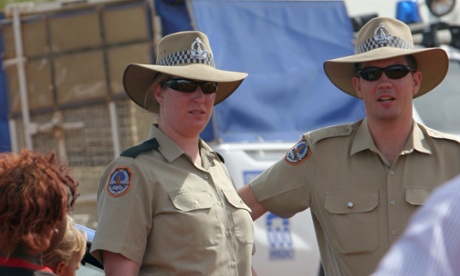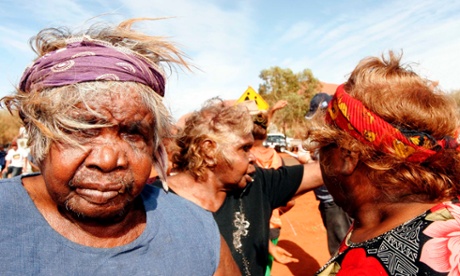WARNING: There is no music in this Musical Dispatch, therefore it is more correctly called an unmusical dispatch. However the tune is similar to many preceding Dispatches; hum along if you know it.
Conservatives and ‘classical liberals’ use Indigenous Australia as a laboratory. Twiggy Forrest’s income management plan is just the latest example
by Jeff Sparrow, first published Monday 4 August 2014, The Guardian
Last month, Coalition backbenchers demanded the abolition of cigarette plain packaging laws, claiming the measures were symptomatic of Labor’s “addiction to nanny state policies”. Other nanny state policies that have drawn the Coalition’s ire in recent years include workplace bullying codes, mandatory poker machine pre-commitments, and bans on smacking children and smoking in cars.
Denouncing the nanny state is the irritable mental gesture of our time, the automatic conservative response to any state-backed project, which makes Tony Abbott’s response to Twiggy Forrest’s plan to quarantine welfare payments all the more remarkable.
In his report on indigenous welfare and employment, Forrest advocates placing 2.5m people on income management. He touts what he calls “healthy welfare cards”, a cashless system that disallows the purchase of certain items, such as alcohol and tobacco. His card will prevent welfare recipients from gambling; family tax benefits will be linked directly to child school attendance.
You might call this a Crocodile Dundee move: “That’s not a nanny state. This is a nanny state.”
By abolishing smacking, Abbott said, Australia would be taking a big step down the Road to Nannydom. Yet he’s declared Forrest’s scheme – a plan that dramatically removes individual agency in order to instil particular social norms – to be “bold, ambitious and brave”.

There’s more going on here than another spectacular Abbott zigzag. These days, most right-wingers in Australia identify themselves not as conservatives but as “classical liberals” – a term that you’ll hear from an IPA representative just about every time you turn on the ABC. Freedom Commissioner Tim Wilson, for instance, attributes his hostility to nannying governments to the liberal philosophers in whose liberty-loving footsteps he follows.
That’s why denunciations of the nanny state so often cite John Stuart Mill, who famously proclaimed the sovereignty of the individual, warning that “the sole end for which mankind are warranted, individually or collectively, in interfering with the liberty of any of their number is self-protection [and] the only purpose for which Power can rightfully be exercised over any Member of a civilised community, against his will, is to prevent harm to others”.
Big government, then, should leave us alone if we chug alcohol or puff tobacco or eat trans fat-saturated lardburgers. That’s our business, not the government’s. Cry freedom! Don’t tread on me! You’ll prise my durry out of my cold, dead, cancerous fingers – and so on and so forth.
Yet, in a less familiar passage, Mill qualifies his position rather significantly – and in ways particularly relevant to the current debate. He writes:
It is, perhaps, hardly necessary to say that this doctrine is meant to apply only to human beings in the maturity of their faculties. We are not speaking of children, or of young persons below the age which the law may fix as that of manhood or womanhood. Those who are still in a state to require being taken care of by others, must be protected against their own actions as well as against external injury. For the same reason, we may leave out of consideration those backward states of society in which the race itself may be considered as in its nonage. […] Despotism is a legitimate mode of government in dealing with barbarians, provided the end be their improvement, and the means justified by actually effecting that end.
So, happily for Abbott, parents do have a right to clip their kids over the ear since, for Mill, children do not possess individual rights – and neither do “barbarians”.

It’s not, as they say, a coincidence that Forrest’s plan to impose unprecedented stipulations on welfare has emerged from an inquiry about Indigenous people. The rehabilitation of income management for the modern age took place as part of the Northern Territory intervention into Aboriginal communities back in 2007. At the time, the overt restrictions of liberty represented by welfare quarantining were justified in precisely Mills’ terms: measures intended to “improve” Indigenous people, were backed by force (the Intervention involved, let us not forget, the deployment of the army). It was on that basis that so many liberals supported John Howard.
Naomi Klein has written about what she calls “The Shock Doctrine”: the way states exploit natural or manmade disasters to impose free market economic reforms on a still-reeling populace. She gives the example of Hurricane Katrina, a catastrophe the Bush administration capitalised on to complete a long-planned privatisation of the New Orleans school system.
The NT Intervention represented something similar. The revelations about sexual abuse in the NT (many of which turned out to be fraudulent) created an understandable desire for immediate action. Howard and his minister Mal Brough seized the opportunity to introduce measures bearing no relation to the recommendations of the Little Children are Sacred report, the document to which they were supposedly responding.
The NT became, in other words, a laboratory for experimental social policies that would never have been accepted anywhere else, such as the draconian ban on porn and the introduction of an internet filter on most computers in remote communities. Alcohol and X-rated DVDs are not exactly unknown in Canberra – but it’s impossible to imagine any government insisting on erecting big blue signs outside houses in Deakin or Barton warning that the inhabitants were prohibited from consuming pornography and alcohol.
Income management, of a kind that seems mild compared to Twiggy Forrest’s proposals, was one of those experiments born during the Intervention, but it wasn’t exactly new. Rich people have always thought that they could do a better job being poor than those currently in the role.

In her famous 1913 pamphlet, Round about a pound a week, Maud Pember Reeves wrote contemptuously about “the gospel of porridge” – the idea, still common among the wealthy, that the destitute wouldn’t be so wretched if only they invested their money wisely.
Orwell, too, knew something of the logic behind “healthy welfare cards”, a phrase that might have come straight from 1984. “A millionaire may enjoy breakfasting off orange juice and Ryvita biscuits,” he wrote in The Road to Wigan Pier, “but an unemployed man doesn’t … When you are unemployed, which is to say when you are underfed, harassed, bored, and miserable, you don’t want to eat dull wholesome food … Unemployment is an endless misery that has got to be constantly palliated.”
That’s why the poor have always hated the management of benefits. Barbara Shaw, the Alice Springs-based anti-Intervention campaigner, speaks of how welfare quarantining particularly rankles with Indigenous people who remembered the not-so-distant past: “There are a lot of people out there who, when they were young fellas, they only got paid rations. … When we go shopping with our BasicsCard, it’s, “Oh, can you hurry up!” They talk to us like we’re deaf.’
In Australia, activism by the jobless during the Great Depression won a general acceptance that the dole should be paid in cash, precisely so that those who received it could exercise some agency in their expenditure. The Intervention eroded that consensus, at least when it came to Indigenous Australia – and paved the way for Labor to trial welfare quarantining in the outer suburbs of Sydney and Adelaide in 2012, a scheme soon to be expanded under the Coalition.
None of this is to say Forrest’s scheme will get up in its entirety, because it almost certainly won’t. Nevertheless, in the Australian last week, Dennis Shanahan assured us that Twiggy is “a compassionate and visionary billionaire” whose “strengths and insights” have “translated into some fine and viable policy options”. Unfortunately, he writes, Forrest’s new wheeze is “socially and politically unacceptable”, since there are “too many scenarios where the action would seem draconian, unsupportable and even demeaning”.
Shanahan’s probably right. But let’s think about what he’s saying. As Abbott reminded us, welfare quarantining has been around for many years, but it’s still mostly applied to Indigenous people. Everyone knows that no government could get away with subjecting millions of white people to the treatment routinely dished out to Indigenous Australia – at least, not yet. It’s only despotic nanny statism when applied to civilised white men.
Abbott might have been knocked somewhat off balance by Forrest (rather as he was in the Senate by another “visionary billionaire”) but one doubts that he’s too upset about it. The Liberals might not be about to implement the Twiggy plan but the general thrust of Forrest’s argument is not that far from what Abbott’s been saying: welfare recipients have had it too easy for too long, and they’re about to get some stick. That general message is probably more important than the fine details.
